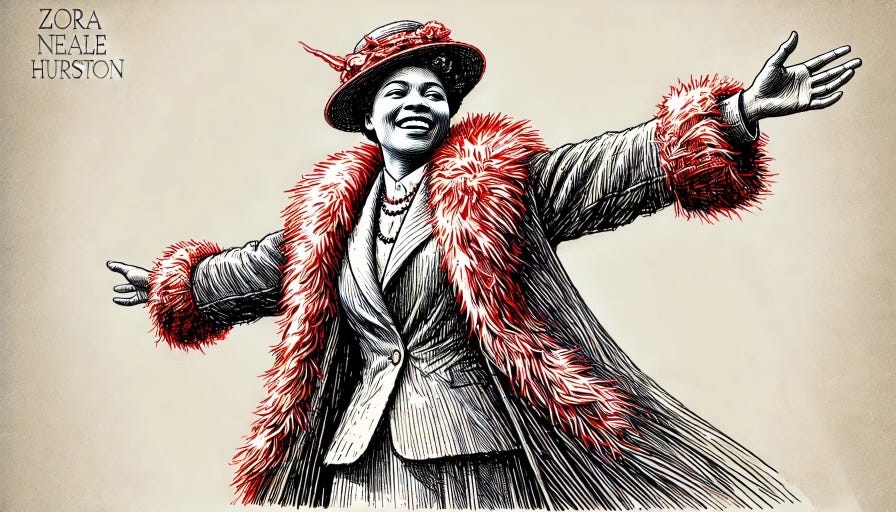I found Valerie Boyd’s “Wrapped in Rainbows” to be more than a Zora Neale Hurston biography. Rather, it’s an evocative portrait of a woman whose life embodies the complexities, brilliance, and indomitable spirit of a Black woman in America.
Through Boyd’s meticulous research and rich narrative, readers are invited into the world of Hurston—a world teeming with cultural significance, profound creativity, and a relentless pursuit of freedom.
Zora Neale Hurston was a force of nature. Born in Eatonville, Florida—the first incorporated all-Black town in the U.S.—she was steeped in a community that celebrated Black self-governance and cultural pride. This upbringing profoundly shaped Hurston’s worldview, infusing her work with themes of autonomy, resilience, and joy.
Boyd vividly captures the essence of this community, showing how Eatonville provided Hurston with a sense of identity that would anchor her throughout her life, even as she moved nomadically through a society often hostile to Black creativity and independence.
Hurston’s significance to Black history is undeniable. She was a key figure of the Harlem Renaissance, mingling with luminaries like Langston Hughes and Wallace Thurman, yet she always charted her own course. Her refusal to conform to the literary and political expectations of the time—expectations often imposed by white patrons and critics—speaks to her unwavering commitment to artistic freedom.
Hurston wrote with an audacious sense of liberty, celebrating the richness of Black Southern culture and folklore at a time when such narratives were marginalized. In a society that demanded assimilation, Hurston’s work stood as a bold declaration that Black life in all its diversity was worthy of art and literature.
Boyd’s work masterfully navigates Hurston’s many layers—the academic rigor of her anthropological work, the lyricism of her storytelling, her complex relationships with friends and lovers, and her fascination with spirituality and voodoo.
Hurston’s life was one of continuous evolution, marked by moments of both triumph and tragedy. She published seven books, including her acclaimed novel “Their Eyes Were Watching God,” which is now a cornerstone of Black literature.
Yet, despite her literary genius, Hurston faced poverty, obscurity, and rejection in her later years. Boyd does not shy away from these darker aspects of Hurston’s life, instead embracing them as integral to understanding the fullness of her humanity.
One of the most striking themes in “Wrapped in Rainbows” is Hurston’s view on freedom—both personal and artistic. Hurston was fiercely independent, often distancing herself from the political ideologies that defined the Black intelligentsia of her time.
She valued the liberty to explore her own path, even if that path was misunderstood or criticized by others. For Hurston, freedom was not just about resisting oppression; it was about embracing the fullness of one’s identity and creativity without apology.
This philosophy resonates deeply with me, especially as I reflect on the gift of nomadic lived experiences. Like Hurston, I have come to see the value in wandering, in allowing life’s journey to unfold without rigid expectations, and in finding freedom in the fluidity of existence.
Hurston’s nomadic lifestyle—moving from place to place, collecting stories, and immersing herself in different cultures—was not simply a consequence of her financial struggles; it was a deliberate choice that fueled her creativity.
Her ability to observe and record the nuances of Black life, whether in the rural South or the urban North, is a testament to the power of lived experience as a source of knowledge.
Boyd’s biography honors this aspect of Hurston’s life, showing how her travels and studies were integral to the development of her voice—a voice that continues to resonate across generations.
In reflecting on Zora Neale Hurston’s legacy, I am reminded of the importance of preserving and celebrating our cultural stories, even when they challenge dominant narratives. Hurston’s work was a celebration of Black life in its raw, unfiltered form—its humor, its pain, its beauty.
She believed in the inherent worth of her people’s experiences and fought to ensure those stories were told with dignity and truth. Boyd’s “Wrapped in Rainbows” not only illuminates Hurston’s extraordinary life but also serves as a powerful reminder that freedom, both in art and life, is found in the courage to live authentically, to embrace the fullness of one’s heritage, and to remain unapologetically oneself.
Zora Neale Hurston’s voice, like thunder rumbling in the distance, continues to echo through the corridors of Black history—demanding to be heard, celebrated, and remembered.
Join Our Community Today
As a supporting member of "Black Books, Black Minds," you'll provide much needed resources for me to continue to dive deeper into a world where your reading passions around Black History thrive.
For just $6 a month or $60 a year, you unlock exclusive access to a close-knit community eager to explore groundbreaking authors and books.
So join us today. Your participation and support are welcomed and appreciated.






I’m so glad you are honoring her so well in this article. She’s one of my favorite authors ❤️
Thank you for bringing this into my consciousness today; it was exactly the inspiration I was seeking this morning, and I am looking forward to reading the book!